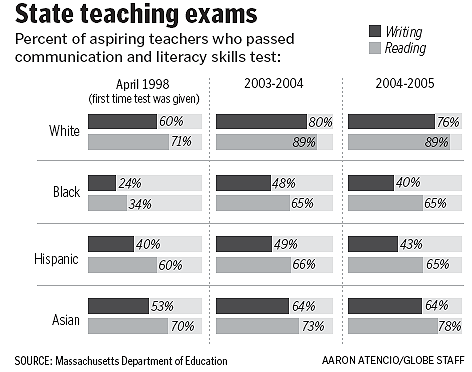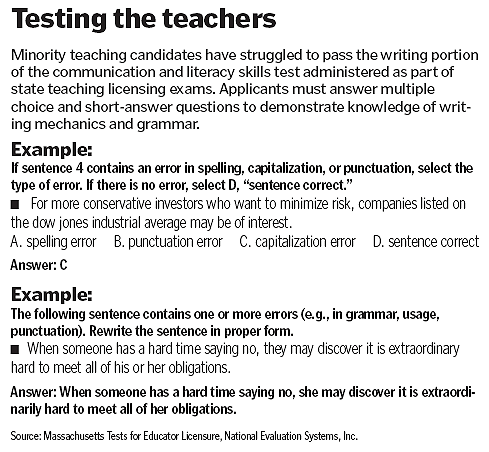| Want to send this page or a link to a friend? Click on mail at the top of this window. |
More Special Reports |
| Posted August 19, 2007 |
| Minority scores lag on teaching |
| Panel to study failure rate, bias complaints |
By Tracy Jan, |
Globe Staff |
More than half the black and Hispanic applicants for teaching jobs in Massachusetts fail a state licensing exam, a trend that has created a major obstacle to greater diversity among public school faculty and stirred controversy over the fairness of the test.
The minority failure rate has been demonstrably higher than among whites since the test's inception nearly a decade ago, according to state statistics, which show that 52 percent of Hispanic applicants and 54 percent of black applicants fail the writing portion of the exam. By comparison, 23 percent of whites fail. Black and Hispanic teachers also lag behind white teachers in major subject tests such as English, history, and math.
The problem has become so acute that a state task force of teachers, professors, hiring directors, and state education officials convened last week to begin examining why minorities fare so much worse on the tests.
"One of the fallouts which is particularly upsetting in our expe rience across the colleges is fewer and fewer students of color are even going into teaching because word has gotten out that these tests are very difficult for them," said Sally Dias, a vice president at Emmanuel College in Boston who is a member of the panel. "One test should really not be a determinant of someone's career."
Stiffer federal rules about teacher quality have increased educators' worries about the results of the teaching test, which more than 16,000 Massachusetts teachers take annually. States, under a 2001 federal law, must show teacher competency under a bar set by the state. In Massachusetts, school districts now risk losing federal money if they are not making progress toward licensing all teachers.
 |
|
 |
Education school deans in the last year began expressing concerns about the minority teachers' high failure rates to state officials and asked the state to evaluate the validity of the test and consider other ways of judging prospective teachers. They and others say the minority teachers' results raise questions about whether the design of the Massachusetts Tests for Educator Licensure is culturally biased and whether the quality of education that minority teaching applicants receive is good enough.
The state's teachers have had to take a battery of tests to get their licenses since 1998, under rules set in the 1993 Education Reform Act. Before 1998, teachers qualified for licenses if they passed certain college courses and had completed student teaching.
Chris Anderson, chairman of the state Board of Education, said he is open to other ways of assessing teachers as long as standards are not lowered.
"There's no reason to have any barriers to quality teachers if we don't need them," he said. "But at the same time, we need to have accountability and assurance that there are basic abilities for any new teacher in Massachusetts.
To receive state certification, teachers must pass the reading and writing tests, known as communication and literacy skills, as well as exams in the subjects they teach. They can take the tests as many times as necessary to pass, but can continue teaching only if their school systems apply to the state for waivers, which have become more difficult to get. Boston dismissed more than 100 teachers last year because they were unlicensed.
Aspiring minority teachers and education professors first complained to the state about the tests after it was first administered in April 1998, when 60 percent of white test takers passed the writing portion, compared with 24 percent of blacks and 40 percent of Hispanics. A similar but narrower gap still exists in reading. Asians also trail whites but pass at a higher rate than blacks and Hispanics.
The writing test, where minorities fare the worst, asks multiple choice questions about spelling, punctuation, and capitalization. Teachers must also show their knowledge of grammar by editing reading passages and defining grammatical terms. They also must write an essay, and summarize a reading passage.
Some minority teachers have criticized the test for containing culturally biased questions such as readings about investing in the stock market and ancient literature that white, middle-class applicants and those with liberal arts college backgrounds more readily identify with. Many minority teachers in urban school systems began their education careers as teacher aides or parent volunteers, and earned their education degrees at night and during summer courses in local colleges.
A Cambridge lawyer said he plans to file a class-action lawsuit shortly against the state Department of Education and the testing company on behalf of three minority teachers who failed the test multiple times since 1998 and lost their jobs.
Armando Jaime, who was teaching special education on a waiver in the Boston Public Schools for eight years, was demoted to a nonteaching job last year after his waiver was denied because he had failed the teaching test at least eight times since 1998. His $62,000 teaching salary was cut nearly in half, he said, and he was forced to take a part-time job as a waiter.
Jaime's transcript from Lesley University, where he received his master's degree in May 2006, shows a slew of A's and B's.
"I felt devastated, thinking I went to school for nothing," said Jaime, 46, a native Spanish speaker from Puerto Rico who was a teacher's aide for nine years before becoming a teacher. "My degree felt diminished."
Testing specialists disagree on whether the state's teaching tests, administered by National Evaluation Systems Inc., are biased against minorities. Some call the tests defective because other teacher tests run by the company have been invalidated in the courts. In 1989, a federal judge ruled that the company's tests in Alabama were flawed and ordered them discontinued after a group of black teachers filed a lawsuit.
Massachusetts has a committee that reviews the tests for bias to make sure the content does not disadvantage test takers from different cultural or ethnic backgrounds. But the state task force plans to scrutinize the test more and make recommendations by December or early next year, said Heidi Guarino, the education department spokeswoman. In addition to 1998 results, the state recently analyzed test data from 2003 to 2006 and established a persistent pattern of failure among minorities, she said.
Some school system officials liken the disparity among teaching applicants' test results to the achievement gap between black and Hispanic students, and their white and Asian classmates.
"If you take the achievement gap of high school students, you can just project it forward into college and into the teaching ranks," said Nick Balasalle, an educational consultant working in the Boston Public Schools and who belongs to the state's new task force.
He and others said minority teachers who graduate from more selective teacher training programs fare better on licensure tests than those who attend less selective programs. Rather than scrap teacher testing, the state should focus on the quality of teaching colleges, many said.
"We ask the students to meet performance standards so we should do no less for the teachers," Balasalle said.
In Boston, the school system two years ago began subsidizing courses on the state tests for more than 650 substitute teachers, teacher aides, and teachers who had not yet passed the tests. The Black Caucus of the Boston Teachers Union also plans to conduct its own study sessions for minority teachers starting this fall.
"It's at a do or die stage," said Sarita Thomas, chairwoman of the caucus and an eighth-grade math teacher in Boston. "We're losing too many of our good teachers because they're not given waivers or extra time to pass these tests."
Tracy Jan can be reached at tjan@globe.com.
© Copyright 2007 Globe Newspaper Company. Reprinted from the Boston Globe of Sunday, August 19, 2007.
© 2007 The New York Times
| Wehaitians.com, the scholarly journal of democracy and human rights |
| More from wehaitians.com |